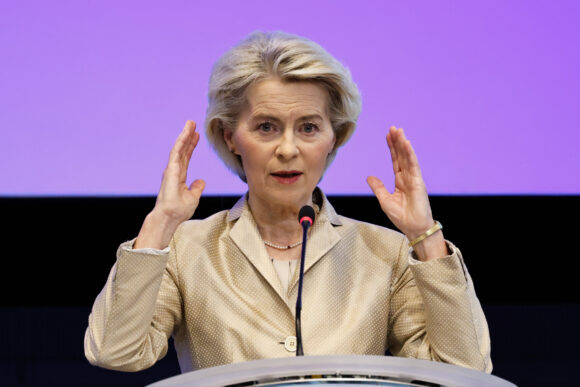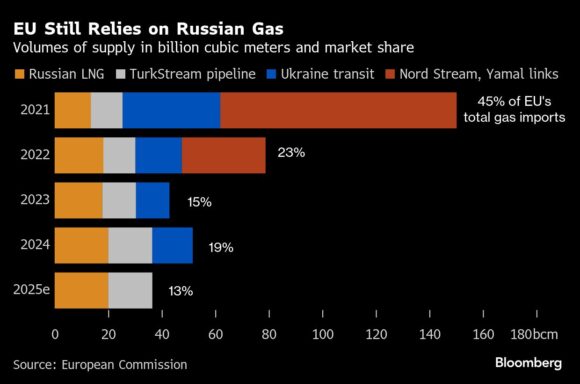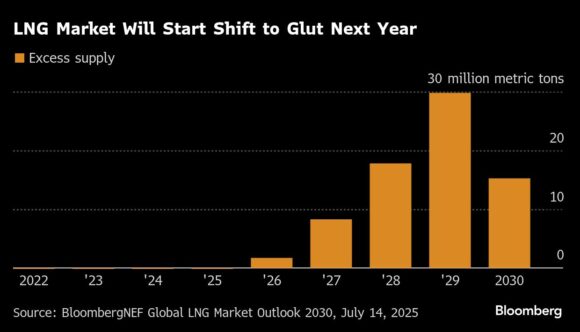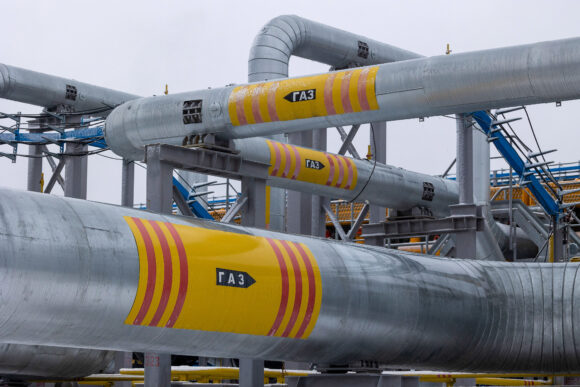The European Union proposed a complete ban on imports of Russian liquefied natural gas from Jan. 1, 2027, as part of its latest measures to curb President Vladimir Putin’s ability to wage Moscow’s war against Ukraine.
The EU also proposed a full transaction ban on more Russian banks and financial institutions as well as trade restrictions on entities in China and India, which have enabled Moscow to get around the bloc’s sanctions.
The shift comes just days after US President Donald Trump called on the EU to step up pressure on Russia’s energy trade. The EU was originally planning to phase out Russian fossil fuels by the end of 2027.

“Russia is showing the full extent of its contempt for diplomacy and international law,” European Commission President Ursula von der Leyen told reporters in Brussels Friday. “Again and again, President Putin has escalated — and in response, Europe is increasing its pressure.”
The EU imports about €500 million ($587 million) to €700 million of LNG from Russia every month, according to data compiled by Eurostat.

The global gas market is expected to start shifting into a surplus in the second half of next year, reducing the risk that the phaseout of Russian gas could put pressure on European supplies and lead to price spikes. This is a key factor for the EU to determine when it can cut out Russian energy.
European natural gas prices declined after the news, suggesting traders had anticipated that the ban on Russian seaborne cargoes would come into effect earlier — before a wave of new supply from the US that is set to come online toward the end of 2026.
“The EU will be able to offset the loss of Russian LNG without major price spikes with more US supply,” said Florence Schmit, an energy strategist at Rabobank in London. “As the phaseout is not imminent, it opens up questions about the desirability of the US to impose other sanctions on Russia’s energy sector.”
The new sanctions package represents a more finely honed approach for the EU, which is responding to Moscow’s intensified attacks on Ukraine and Russia’s recent drones incursion into Poland. EU sanctions require unanimous adoption by member states.
The EU is also proposing a prohibition of companies from re/insuring vessels that have been sanctioned by the bloc, according to a statement by the EU’s top diplomat, Kaja Kallas.
“We will intensify pressure on Russia with increasingly hard-hitting sanctions, coupled with military support for Ukraine, until Russia accepts a genuine ceasefire and comes to the table with a serious proposal for peace,” Kallas told reporters in Brussels Friday.
The EU also proposed closing loopholes that allow Gazprom Neft PJSC and Rosneft PJSC, the state-controlled giant accounting for more than a third of Russia’s total oil production, to export to Europe, von der Leyen said. The EU also plans to expand sanctions on Russia’s shadow fleet to include more than 100 new vessels, meaning more than 560 ships will be listed under the bloc’s sanctions.
The bloc will also target refineries, oil traders, petrochemical companies in third countries, including in China, she said.
The EU has been coordinating its measures with the US and other Group of Seven nations. G-7 officials are currently working on a package of proposals that they’re aiming to finalize later this month.

In addition to energy-related measures, the bloc is also proposing new restrictions on trade and financial services. These include sanctions on at least five Russian banks, some lenders in Belarus and Kazakhstan, as well as a number of crypto exchanges, according to a person familiar with the matter.
The EU also proposed new export bans on more than €40 billion worth of goods, including minerals, ceramic and rubber used by Moscow’s military industry, said the person, who spoke on the condition of anonymity.
The US and EU have also been making progress on using some $300 billion in frozen Russian central bank assets to support Ukraine and proposals on how to do that are expected soon.
“We are working on a new solution to finance Ukraine’s defense efforts based on the immobilized Russian assets,” von der Leyen said. “This is Russia’s war, and the perpetrator must pay for it.”
Photograph: A gas and condensate field in Russia. Source: Bloomberg
Was this article valuable?
Here are more articles you may enjoy.



 Lemonade Books Q4 Net Loss of $21.7M as Customer Count Grows
Lemonade Books Q4 Net Loss of $21.7M as Customer Count Grows  AI Claim Assistant Now Taking Auto Damage Claims Calls at Travelers
AI Claim Assistant Now Taking Auto Damage Claims Calls at Travelers  Experian Launches Insurance Marketplace App on ChatGPT
Experian Launches Insurance Marketplace App on ChatGPT  Insurance Broker Stocks Sink as AI App Sparks Disruption Fears
Insurance Broker Stocks Sink as AI App Sparks Disruption Fears 

